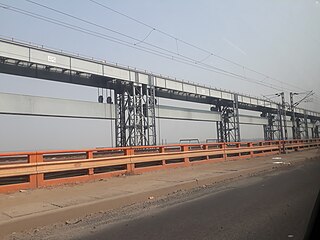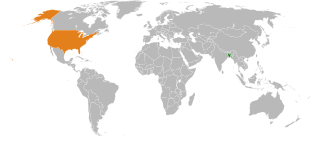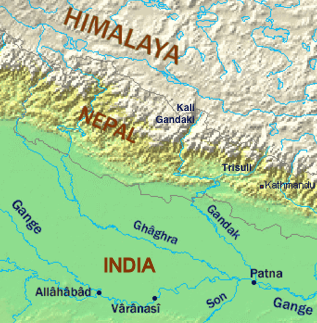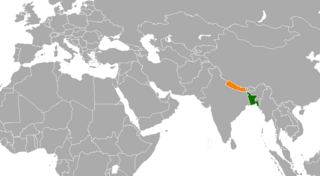Related Research Articles
India, officially the Republic of India, has full diplomatic relations with 201 states, including Palestine, the Holy See, and Niue. The Ministry of External Affairs (MEA) is the government agency responsible for the conduct of foreign relations of India. With the world's third largest military expenditure, second largest armed force, fifth largest economy by GDP nominal rates and third largest economy in terms of purchasing power parity, India is a prominent regional power and a potential superpower.

Though the Ministry of Foreign Affairs (MOFA) is the government agency which is responsible for conducting the foreign relations of Nepal, historically, it is the Office of the Prime Minister (PMO) which has exercised the authority to formulate the country's foreign policies. As a landlocked country wedged between two larger and far stronger powers, Nepal has tried to maintain good relations with both of its neighbors, People's Republic of China and Republic of India. However, the relationship between Nepal and India was significantly hampered by the 2015 Nepal blockade when the Government of Nepal accused India of mimicking "Russia-Ukraine" tactics by using ethnically Indian residents of Nepal to cause unrest along Nepal's southern border. India denied the allegation and said the unrest were an internal affair. For the most part though, Nepal has traditionally maintained a non-aligned policy and enjoys friendly relations with its neighboring countries and almost all the major countries of the world.

The foreign relations of Bangladesh are Bangladesh's relationships with foreign countries. The Government of Bangladesh's policies pursue a moderate foreign policy that heavily relies on multilateral diplomacy, especially at the United Nations (UN) and the World Trade Organization (WTO). Since its independence in 1971, Bangladesh has stressed its principle of "Friendship towards all, malice towards none" in dictating its diplomacy. As a member of the Non-Aligned Movement, Bangladesh has tended to not take sides with major powers. Since the end of the Cold War, Bangladesh has pursued better relations with its neighbours and other nearby states.

Bhutan has diplomatic relations with 56 of 193 member states of the United Nations and the European Union. Bhutan's limited number of such relations, including the absence of formal relations with any of the permanent members of the United Nations Security Council, is part of a deliberate isolationist policy of limiting foreign influence in the state. This stance has been safeguarded by close relations with India, of which Bhutan has previously been considered a protected state.
Bilateralism is the conduct of political, economic, or cultural relations between two sovereign states. It is in contrast to unilateralism or multilateralism, which is activity by a single state or jointly by multiple states, respectively. When states recognize one another as sovereign states and agree to diplomatic relations, they create a bilateral relationship. States with bilateral ties will exchange diplomatic agents such as ambassadors to facilitate dialogues and cooperations.

The Simla Agreement, also spelled Shimla Agreement, was a peace treaty signed between India and Pakistan on 2 July 1972 in Shimla, the capital city of the Indian state of Himachal Pradesh. It followed the Indo-Pakistani War of 1971, which began after India intervened in East Pakistan as an ally of Bengali rebels who were fighting against Pakistani state forces in the Bangladesh Liberation War. The Indian intervention proved decisive in the war and led to East Pakistan's breakaway from its union with West Pakistan and the emergence of the independent state of Bangladesh.

Teesta River is a 414 km (257 mi) long river that rises in the Pauhunri Mountain of eastern Himalayas, flows through the Indian states of Sikkim and West Bengal and subsequently enters Bangladesh through Rangpur division. In Bangladesh, it merges with Brahmaputra River which after meeting some other major rivers of the Bengal delta finally falls into the Bay of Bengal. It drains an area of 12,540 km2 (4,840 sq mi). In India, the Teesta flows through Mangan District, Gangtok District, Pakyong District, Kalimpong district, Darjeeling District, Jalpaiguri District, Cooch Behar districts and the cities of Rangpo, Jalpaiguri and Mekhliganj. In Bangladesh, it flows through Lalmonirhat District, Rangpur District, Kurigram District and Gaibandha District. It joins the Brahmaputra River at Phulchhari Upazila in Bangladesh. 305 km (190 mi) of the river lies in India and 109 km (68 mi) in Bangladesh. The Teesta is the largest river of Sikkim and second largest river of West Bengal after the Ganges.
The Feni is a river in southeastern Bangladesh and Tripura state of India. It is a trans-boundary river that is the subject of an ongoing dispute about water rights. The Feni River originates in South Tripura district and flows through Sabroom town and then enters Bangladesh. Muhuri River, also called Little Feni, from Noakhali District joins it near its mouth. The river is navigable by small boats as far as Ramgarh, about 80 kilometres (50 mi) upstream.

Bangladesh–India relations are the bilateral relations between the People's Republic of Bangladesh and the Republic of India, both of which are South Asian neighbours. Diplomatic relations between the two countries formally began in 1971 with India's recognition of an independent Bangladesh following India's military intervention helping Bangladesh secure independence following the Bangladesh Liberation War.

Farakka Barrage is a barrage across the Ganga river located in Murshidabad district in the Indian state of West Bengal, roughly 18 kilometres (11 mi) from the border with Bangladesh near sahibganj. Farakka Barrage Township is located in Farakka in Murshidabad district. Construction of the barrage started in 1962, and was completed in 1970 at a cost of 1 billion dollars. It became operational on 21 April 1975. The barrage is about 2,304 metres (7,559 ft) long. The Feeder Canal (Farakka) from the barrage to the Bhagirathi-Hooghly River is about 42 km (26 mi) long.

The ongoing pollution of the Ganges, the largest river in the Indian subcontinent, poses a significant threat to both human health and the environment. The river supplies water to approximately 40% of India's population across 11 states and serves an estimated 500 million people—more than any other river in the world.

Bangladesh-United States relations are the bilateral relations between Bangladesh and the United States of America. For the United States, Bangladesh is the 38th largest goods supplier and 60th largest export market. For Bangladesh, the United States is the largest export market. The two countries signed a bilateral investment treaty in 1986. U.S. companies are the largest foreign investors in Bangladesh. The U.S. government is the leading contributor of humanitarian assistance in response to the Rohingya crisis. Both nations have announced similar views for a Free and Open Indo-Pacific.
The India–Bangladesh Treaty of Friendship, Cooperation and Peace was a 25-year treaty that was signed on 19 March 1972 forging close bilateral relations between India and the newly established state of Bangladesh. The treaty was also known as the Indira–Mujib Treaty, after the signatories of the treaty the Prime Minister of India Indira Gandhi and the Prime Minister of Bangladesh Sheikh Mujibur Rahman.

A long-standing dispute exists between India and Bangladesh over the appropriate allocation, and development, of the water resources of the Ganges River, which flows from northern India into Bangladesh. The issue had remained a subject of conflict for almost 35 years, with several bilateral agreements and rounds of talks failing to produce results.

The bilateral relations between Bangladesh and Nepal have been progressive since the foundation of Bangladesh in 1971. The two nations are separated by the "Siliguri Corridor" - a 22 kilometres (14 mi) wide stretch of territory of the Indian state of West Bengal that lies between southern Nepal and northern Bangladesh. Both South Asian nations are members of the South Asian Association for Regional Cooperation (SAARC), the Bay of Bengal Initiative for MultiSectoral Technical and Economic Cooperation (BIMSTEC), and the United Nations (UN).

Foreign relations between Bangladesh and Canada were established 1972. Canada is represented through its High Commission in Dhaka and Bangladesh is through its High Commission in Ottawa. Both countries are members of the Commonwealth of Nations and the United Nations. Bangladesh currently receives ~$110 million from Canadian official development assistance per year as of January 2014. It is estimated that around 36,000 (2012) Bangladeshi people live in Canada, primarily in cities like Toronto, Vancouver, Montreal, Calgary, Edmonton, and Ottawa.

The Ganges Barrage Project was a proposed project in Bangladesh to hold back rain water of the monsoon season because of the periodic drying up of the Ganges River in Bangladesh due to the Farakka Barrage. It was formally cancelled in 2017.

Feeder Canal is a canal associated with Farakka Barrage. It is located in Murshidabad district, West Bengal. The canal is 38.3 km long. The Ganges water from the Farakka Dam is being conveyed to Bhagirathi by way of this canal. Due to the flow of river Hooghly through the Farakka dam project, around 40,000 ft3/s of water is available daily in the Feeder connection. The Feeder canal has been designed keeping in mind the ability to carry this amount of water. However, during the dry season, less water is released. The dry season is from January to May. During the period the flow of water in the feeder canal is reduced from ca. 40,000 ft3/s to 30,000-28,000 ft3/s. If the severe drought brings down the Ganges water from its upper reaches, then less water is available in feeder canal.
The Feni River is a trans-boundary river located in Bangladesh, and the water rights have been a source of dispute between India and Bangladesh. It originates in the South Tripura district and flows through Sabroom town, entering Bangladesh. A Memorandum of Understanding (MoU) has been signed between Bangladesh and India, allowing India to withdraw 1.82 cubic feet per second of water from the Feni River. These two countries have signed seven bilateral documents concerning the water disputes.
References
- ↑ Haq, Enamul (2012). "Ganges Water Sharing". In Islam, Sirajul; Jamal, Ahmed A. (eds.). Banglapedia: National Encyclopedia of Bangladesh (Second ed.). Asiatic Society of Bangladesh.